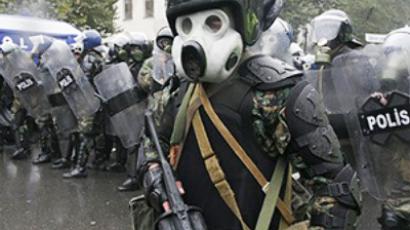Fines and plastic bullets await Georgian protesters
Protesting against the ruling political regime in Georgia has become harder as the country’s parliament has adopted new legislation imposing tougher penalties and stronger bans on rallies.
When the new law comes into force, taking part in demonstrations is going to become more difficult and even dangerous.
According to new amendments to the law “On gatherings and demonstrations”, any participant of a rally can be arrested for up to 90 days or get fined US$ 300.
Police can use plastic and rubber bullets against offending demonstrators. Not that they didn’t do it before, but now they can do it fully in line with the law.
To cope with protests, the country’s law enforcement agencies have American-Belgian FN-303 less-lethal launchers which, according to the opposition, were already used to disperse the rallies in spring this year.
While still needing the President’s seal of approval, the move has angered democratic groups inside and outside the country.
The opposition have been protesting for over three months now against President Saakashvili, and the Georgian government’s answer is a crackdown.
“We will have a situation when police will use special guns which will have a very serious effect for members of manifestations [sic]. This is not a little gun, it’s a ‘semi-little’, gun which is absolutely unacceptable under Georgian law,” says Georgy Targamadze, journalist and opposition leader.
Georgy himself has experienced the brutality of the Georgian police.
In November 2007, the country’s opposition TV news station Imedi was shut down for its coverage of police attacking protestors on the streets of Tbilisi.
Georgy was live on air when officers stormed the news studio.
Now, even going on the streets could mean you're breaking the law if you plan to protest.
“Artificially blocking streets is not freedom of speech and freedom of manifestation [sic]. If the number of people is big enough to block the streets naturally, then it is allowed,” says David Darchiashvili from the European Integration Committee.
Meanwhile, on May 6, during a rally held at the country’s Police Headquarters in the capital Tbilisi, several protesters were wounded with plastic bullets.
Military experts claim a shot to the head of such a rifle from a distance of about three meters can still kill.
Also, polit.ru writes, in providing public order, police will be entitled to use rubber truncheons, tear and pepper gas, ultrasonic gadgets for psychological effect, water cannons, and electric shocks.
Members of the opposition didn’t take part in the vote and, in protest against the fact that none of their arguments were taken into consideration, left the parliament hall. They called the new laws “draconian and inhumane”, and said they don’t comply with the international law.
Some opposition members believe the new laws are driven simply by government vengeance.
“If you consider the political context in which these amendments are made, it becomes clear that the government is trying to get back at the opposition,” says opposition leader Dzhondy Bagaturia.














